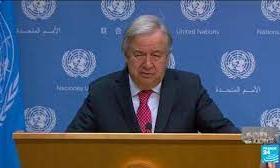
UN Chief expresses frustration over inability to end Gaza war
text_fieldsNew York: In his annual press conference, UN Secretary-General Antonio Guterres voiced deep sadness over his powerlessness to bring an end to the ongoing conflict in Gaza.
Guterres lamented the extensive suffering in the region, acknowledging his inability to stop the war or establish conditions that ensure compliance with international law and humanitarian standards.
"My worst frustration is to see suffering at such a large scale and to know that I haven't the power to stop it. But it's a reality: I haven't the power to stop it," Guterres stated during the press conference, emphasising the magnitude of the humanitarian crisis.
The UN chief warned of a potential "gigantic tragedy" in Rafah if Israel proceeds with its plans to expand its offensive into the southern town, where over one million Palestinians are seeking shelter. He urged for an immediate humanitarian ceasefire, the unconditional release of hostages, and tangible steps toward a two-state solution.
Expressing his disagreement with Israel's policies, settlements, and military operations in Gaza, Guterres criticised the excessive loss of lives and destruction caused by the conflict. While supporting Israel's right to live in peace and security, he remained committed to advocating for Palestinian statehood and an end to the occupation.
Guterres conveyed a message of "total solidarity" with the people of Gaza and a commitment to mobilise the UN system to provide assistance. The ongoing negotiations, facilitated by Qatar, the US, and Egypt, were highlighted as crucial for achieving a ceasefire and the release of hostages.
In response to questions about the International Court of Justice's (ICJ) recent emergency measures, Guterres expressed full support for the ICJ's decisions. The court's rulings called on Israel to prevent acts that might be considered genocidal, punish incitement to genocide, and enable humanitarian assistance to Gaza.
Despite challenges, Guterres acknowledged pressure from the United States on Israel in various humanitarian aid areas, emphasising the need for full respect for international humanitarian law. However, he refrained from providing a definitive assessment of whether the US is leveraging its influence effectively.
"He again condemned the October 7 attack by Hamas and called them "horrible terror attacks". He also called Israel's response collective punishment. If that’s the case, I can’t understand how this is conducted in such a way that has led in Gaza to reportedly around 28,000 people killed, 75 percent of the population displaced, and the destruction of entire neighbourhoods … I think there’s something wrong in the way the military operations have been conducted," he said.
He highlighted that even if Hamas is using human shields, international humanitarian law is clear about the obligation to protect civilians, reported Arab News.























